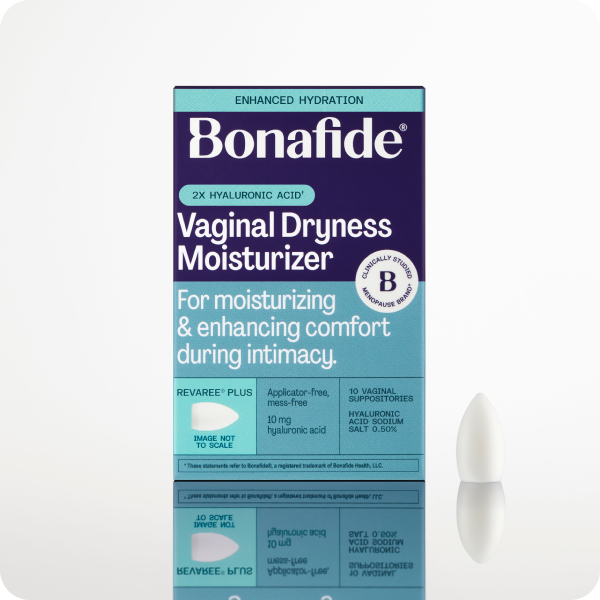Want to print this article for later? Click here.
What is vaginal atrophy? Vaginal atrophy or atrophic vaginitis, as it's clinically defined, is a set of symptoms that includes vaginal dryness, persistent burning, irritation and painful sex. Vaginal atrophy symptoms are an all too common part of life during and after menopause, with roughly 50% of women experiencing vaginal atrophy within a few years of having their last period.1
Although vaginal atrophy typically occurs after menopause2, some women who have never had issues with vaginal dryness may start to experience symptoms during perimenopause. The use of vaginal lubricants is often the first response to addressing the signs of vaginal atrophy and its symptoms, but this only delivers a temporary solution to an issue that could respond better to more consistent management.
The good news is that there are several management options for menopausal vaginal atrophy, including systemic HRT, vaginal hormones or steroids, or hormone-free vaginal inserts that can be recommended based on your symptoms and preferences.
Below, we’ve tapped Bonafide's Chief Medical Officer, Dr. Alyssa Dweck, to give you more insight on what you need to know about the causes of vaginal atrophy, and vaginal atrophy symptoms, including menopausal vaginal dryness, and your options for managing and preventing the worsening of symptoms.
Causes of Vaginal Atrophy in Menopausal Women
Although vaginal atrophy and vaginal dryness refer to the thinning of the internal tissues of the vagina, atrophy can affect a much broader area, including the vulvar (external) skin. "Both the vagina and vulva are affected by estrogen deficiency, so much so that the term “vaginal atrophy” has essentially been replaced by the broader term GSM or genitourinary syndrome of menopause. This verbiage was meant to be inclusive of all genital changes caused by diminished estrogen levels," explains Dr. Dweck. Essentially, the key cause of menopausal vaginal atrophy is linked to estrogen decline, where symptoms, such as dryness, may start out as mild but then can potentially progress if not addressed.
Prefer a quick video on vaginal atrophy from Bonafide Chief Medical Officer, Dr. Alyssa Dweck? Check out the below:
Vaginal Atrophy Symptoms
Other areas that can be affected by menopausal hormonal changes, and present with symptoms associated with vaginal atrophy include the labia, introitus (vaginal opening), clitoris, bladder, and urethra. "Common vulvar symptoms include vulvar dryness, irritation and burning, urinary discomfort (dysuria), frequency, urgency and recurrent UTIs, and sexual symptoms, including pain," says Dr. Dweck.
Although all of the above symptoms can be attributed to menopausal vaginal atrophy, they can sometimes be caused by other issues, which is why it's important to check in with your healthcare provider first to rule out infection or a skin condition, according to Dr. Dweck.
Importance of Vaginal Atrophy Treatment
Besides experiencing unpleasant or painful symptoms, when vaginal atrophy or GSM is left untreated, it can lead to other risks. "The risk of infection, including urinary tract infections, is elevated with GSM. The risk of BV (bacterial vaginosis) is elevated with untreated, unmanaged vulvovaginal atrophy since the vaginal pH can become more alkaline during menopause," says Dr. Dweck. "Perineal fissures (tiny vulvar micro abrasions) can form and cause discomfort day to day or with exercise. Bleeding from external irritation of delicate tissue can also occur," says Dr. Dweck.
When to Seek Treatment for Vaginal Atrophy Symptoms
Vaginal atrophy signs and symptoms can be managed when treated properly. "Cellular tissue changes due to diminished estrogen can be reversed," says Dr. Dweck. Because the vaginal changes are due to diminished estrogen, some people may try estrogen or hormone therapy. But for those who decide not to use hormones, hyaluronic acid is a hormone-free management option. "Studies suggest that hyaluronic acid applied topically to the vagina on a regular basis can reverse tissue changes similarly to vaginal estrogen," says Dr. Dweck.
Revaree® Plus is a hormone-free vaginal insert that contains hyaluronic acid, which Dr. Dweck recommends using as part of a regular moisturizing regime. Other prescription or in-office options include estrogen, DHEA inserts, ospemifene and surgical remedies. "Risks and indications for these must be considered individually," says Dr. Dweck.
Lifestyle Tips for Managing Vaginal Atrophy Symptoms
Consider sexual activity: Dr. Dweck encourages sexual play, either with a partner or alone. Sexual activity increases blood flow to the genitals, which helps to maintain healthy vaginal tissue.
Choose hygiene and personal products wisely: "Some may need to use fragrance and dye-free soaps, detergents and fabric softeners, especially on undergarments. I usually suggest trialing 100% organic cotton pads and liners if applicable and 100% cotton panty crotch material," says Dr. Dweck.
Resources
- https://www.health.harvard.edu/womens-health/managing-postmenopausal-vaginal-atrophy
- https://www.mayoclinic.org/diseases-conditions/vaginal-atrophy/symptoms-causes/syc-20352288












Comments
Post commentReveree is a great product.
I read about Bonafide Reveree and it is a great product. Women, if you want to have a great experience and no longer have all the awful side effects with menopause try this. You will not regret it. It changes your life and there is not a DR. That ever seems concerned about how we feel and how menopause has changed our sex life with our husbands. So get on board women.
I am a breast cancer survivor and have taken an Estrogen blocker for the last 4.75 years & came off of it about 3-4 months ago. My oncologist never said anything about the dryness or atrophy, or what to even expect. Your articles are very informative! Thank you
I heard of dryness before but after menopause it’s shocking when it actually happens to you. Thanks for spreading awareness and offering solutions that actually work.
I’ve been using this product off and on for a couple of years. It is awesime and does what it’s designed to do. I choose to go with Revaree because of my medical history. I love this product, and greatful that this company exist.